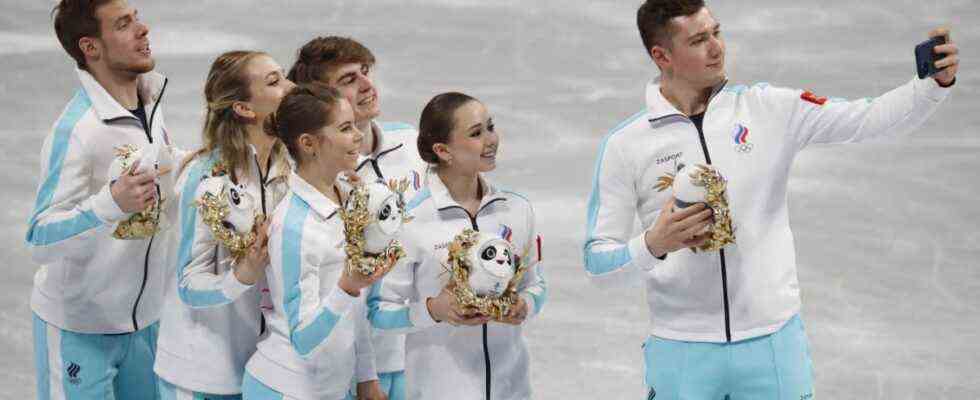The American figure skaters had already put on their finery, the team suits for the medal ceremony on Tuesday evening. Then suddenly the command to stop was heard. The US selection was supposed to receive their silver medals at the ceremony for their performances in the team competition. For this purpose, the athletes will be driven from the Olympic Village to an area near the National Aquatics Center, the water block from the 2008 Summer Games, which is known from radio and television and has recently been rededicated as an ice block and home to the curlers. And now, just before departure: Ceremony postponed indefinitely, without giving any reason.
Russia ahead of the USA and Japan, that’s how they lined up on Monday evening at the first award ceremony, the so-called Flower Ceremony, shortly after the end of the team competition. Whether this picture will also reflect the final outcome of this competition was still quite uncertain on Wednesday in Beijing. Several media initially reported that there had actually been a positive doping test, namely in the Russian team – in the selection that does not compete in Beijing in standard uniforms or with its own anthem and flag because of the state-controlled doping scandal surrounding the Winter Games 2014 in Sochi.
The contours of the case were still fragmentary on Wednesday. Mark Adams, spokesman for the International Olympic Committee, said at the daily press round that the cancellation of the award ceremony was based on “legal complications” – the cause was only developing, he “could not say much” about it. Or: nothing at all. So did the world association ISU and the Russian Ice Sports Federation. Russian reporters even brought the case to Dmitry Peskov, spokesman for Russian President Vladimir Putin. However, Peskow only warned to wait for further information from the officials, which was not forthcoming until Wednesday evening.
“We’re all clean,” says a Russian coach
According to several reports, both in English as well as Russian portals, it is a test that was taken before the competition. And the legal implications? This could be rooted in the consequences of an individual testing positive in a team competition. Article 10.2 of the World Anti-Doping Agency Rules dictates that even “more than two” members of a team must be watertight before the selection is sanctioned. But this only applies to team sports. In individual sports that have team competitions – like figure skating – the bar is lower. This is enshrined in the ISU Anti-Doping Rules, Article 11.2: A case “during or in connection with” an event will result in the entire team being disqualified. Unless the athlete concerned can demonstrate that they acted neither “negligently” nor at fault.
The big question would then still be: did the possible positive test fall into the “event period”, the time of the competition? Some Russian media interpreted Wednesday’s rules as meaning that this period begins on the eve of the competition. The rules of the world association, which spans the organizational and legal framework for all competitions, extend this period significantly further: beginning “24 hours before the official draw until twelve hours after the last competition”. However, it would not be the first time that resourceful sports lawyers have unearthed sets of rules that stipulate something else.
Impressive skill: Kamila Valiyeva has been instrumental in the Russian team’s success – is she now involved in a doping case?
(Photo: David McIntyre/ZUMA Wire/Imago)
According to the “Insidethegames” portal, the case could also be due to that the athlete in question is Kamila Valiyeva. The 15-year-old played a huge part in her team’s success, she had performed two quadruple turns in the competition alone – and did not show up for training on Wednesday as planned. Valiyeva’s involvement would complicate the case by not allowing athletes under the age of 16 to be officially named should they be involved in a doping case. The International Test Agency, which coordinates the anti-doping tests in Beijing, initially did not want to comment on the details of the affair.
Russia’s delegation is again sporting in the stale light in Beijing
Tatyana Tarasova, one of the most famous and successful coaches of Russian figure skaters, denied to the state news agency Tass again that a doping finding had triggered the legal turbulence. “You can point your finger at us,” she was quoted as saying, “but we’re all clean!”
Russia’s delegation is sporting in Beijing again in the stale light: The Cas Sports Court imposed a two-year ban in December 2020, which, after an initial ruling by the World Anti-Doping Agency Wada, he had also undermined – despite massive Evidence that Russian authorities had been cheating systemically for years, even manipulating records up to 2019.
The Russian Olympic Committee is still allowed to send a team to all international competitions, only the country name, the flag and the anthem are banned. Ahead of the Summer Games in Tokyo, Russian officials even considered nominating the “Katyusha” song as a placeholder for awarding medals; a Soviet-era love anthem in which a woman sings of her lover at war. But that was too much even for the Cas. Instead of Katyusha, Tchaikovsky’s Piano Concerto will also be heard in Beijing. It remains to be seen whether it will sound again for the Russian figure skating selection, which does not officially compete for Russia.

